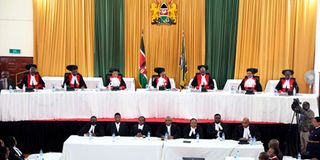Blow to Mark Too’s family as Supreme Court rejects new evidence bid in land fight with squatters

The Supreme Court in a past session.
What you need to know:
- Too's family has been locked in a bitter dispute with squatters who were awarded the multi-billion-shilling land in Kapseret by the courts.
- The family had approached the Supreme Court after the Court of Appeal on November 18 upheld the decision of the Eldoret Environment and Lands Court to award the squatters the disputed land.
- The Supreme Court court ruled that the applications by the individual and the institution did not meet the threshold for admission as interested parties.
The family of the late Kanu politician Mark Too has suffered a blow in its bid to reclaim the controversial 25,000 acres of land it lost to Sirikwa squatters in Eldoret after the Supreme Court rejected its application to present new evidence in the case.
Too's family has been locked in a bitter dispute with the squatters, who were awarded ownership of the multi-billion-shilling land in Kapseret constituency by the Court of Appeal last year.
The family had approached the Supreme Court after the Court of Appeal on November 18 upheld the decision of the Eldoret Environment and Lands Court to award the squatters the disputed land.
Supreme Court judges Philomena Mwilu, Mohamed Ibrahim, Njoki Ndung’u, Isaac Lenaola and William Ouko on June 16 dismissed an application by Too's widow, Sophia Chemengen, to adduce additional evidence in the case seeking to overturn the Court of Appeal's ruling.
New evidence
Through Ngatia and Associates Advocates, Mrs Too, a co-administrator of the late MP's estate, asked the court to allow her to submit new evidence regarding the transfer of the land by Lonhro East Africa.
"That this honourable court admit additional evidence to be adduced by the appellant as set out in the affidavits of Sophia Chemengen Too and Jeremy Paul Henry Hulme (Lonrho managing director) in such manner as this court may direct and/or direct that the evidence of the duo (Mrs Too and Mr Hulme) be taken by the court or the registrar of this court," read Ms Too's application filed on January 9, 2023.
In an affidavit by Mrs Too and Mr Hulme, the additional evidence relates to four separate issues, namely evidence by Mr Hulme that he did not write or sign the alleged letter of November 9, 2000; that the surrender of the leasehold titles under the Registration of Titles Act was in consideration of Lonrho Agribusiness (EA) Ltd obtaining freehold titles under the Registered Land Act; Mr Hulme's evidence of the impact of the judgment on numerous purchasers, and evidence that the late Too held a share in the applicant company and that he had ceased to be chairman of Lonrho in September 2000.
'Forged letter'
They claimed that the letter of surrender of the land was a forgery.
In its ruling, the court said that although it had been sworn that ‘the evidence to be adduced is neither voluminous nor argumentative and that it is specific, direct and extremely concise’, “this evidence has not been produced to us and we were left to speculate as to its contents”.
"In short, the application has not satisfied the conditions precedent set out in the Mohamed Abdi Mahamud case (supra). Consequently, we find that the applicant has not met the threshold for the issuance of an order for the admission of additional evidence," the court ruled in dismissing the application.
At the same time, the court dealt another blow to 1,166 people who bought land from the late MP after their application as an interested party was dismissed. They occupy about 6,000 acres of land grouped under LR N0 9606, 9608, 742/2, 7739/7R, 12398, 10793 and 10794.
Kibwari PLC and the University of Baraton also lost 500 acres and 279 acres, respectively, after their application for an injunction was also rejected. They also bought land from the late Too.
The judges said the Court of Appeal in 2017 directed Fanikiwa, who joined the matter at the appeal stage, to publish an advertisement in a newspaper of wide circulation informing the public of the matter before the Court of Appeal, and that they should join if they had an issue.
Sirikwa also argued that the intended interested parties were raising a new cause of action before the Supreme Court.
LSK bid
The court ruled that the applications by the individual and the institution did not meet the threshold for admission as interested parties.
"We find that the applicants have not met the threshold for admission as interested parties, as they have all failed to establish the prejudice they will suffer if they are not admitted as interested parties. We note that there are a large number of interested parties in the appeal whose cause largely revolves around what all the interested parties seek to raise. As such, they will not be prejudiced in any way," the judges said.
The Law Society of Kenya's application to be joined as amicus curiae in the case was rejected. The LSK had said in its application that it would assist the court on the issues of legitimate expectations vis-à-vis the rule of law, the meaning of innocent purchaser for value without notice vis-à-vis the right to a fair hearing.
"We are not persuaded that the LSK has the requisite expertise to assist the court in this matter, and from a perusal of the appeal, we do not see how the amicus brief addresses any points of law that have not already been addressed by the parties to the proceedings. Therefore, we are not inclined to admit the LSK as amicus curiae," the court ruled in dismissing the LSK.





